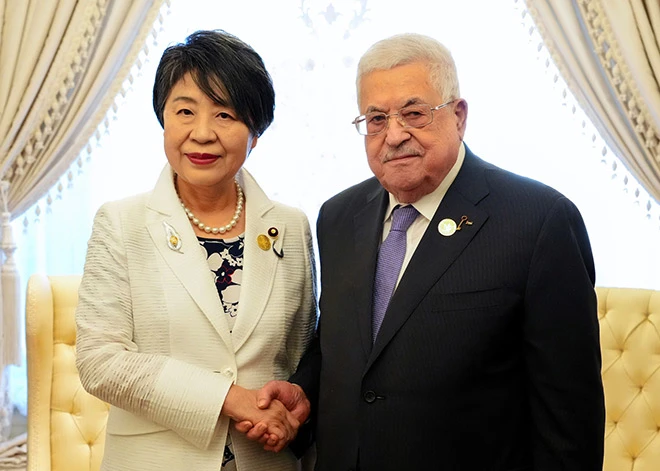Japan, G-7 on Different Pages Regarding Middle East Conflict
MIDDLE EAST AND NORTH AFRICA, 6 Nov 2023
Shino Matsuyama and Akira Nemoto | The Asahi Shimbun - TRANSCEND Media Service

Japan Foreign Minister Yoko Kamikawa meets with Palestinian Authority President Mahmoud Abbas in Cairo on 21 Oct 2023
(Provided by the Foreign Ministry)
27 Oct 2023 – Japan’s diplomatic approach to the conflict between Israel and the Palestinian Islamic group Hamas differs from other Group of Seven nations, which have expressed sole support for Israel.
And in contrast to its recent attempts to show leadership as the G-7 chair regarding Russia and China, Japan is struggling to engage in balanced diplomacy in the Middle East.
While holding dialogue with Arab countries, the government is making final arrangements for Foreign Minister Yoko Kamikawa to visit Israel in early November.
“Based on our stance to support the two-state solution, we will work on building trust between the parties involved through our country’s own initiatives, such as the Corridor for Peace and Prosperity concept,” Prime Minister Fumio Kishida said at an Upper House plenary session on Oct. 25.
Japan has long supported the two-state solution, in which Israel and Palestine coexist as independent nations. It has also promoted the Corridor for Peace and Prosperity concept to support Palestine’s economic independence.
Kishida’s remarks indicate Japan’s stance has not changed.
JAPAN, U.S. OUT OF STEP
Even after Hamas’ attack on Israel, Japan has maintained a balanced diplomacy, valuing friendly relations with both Israel and Arab nations supporting Palestine.
A key reason is Japan’s heavy reliance on the Middle East for more than 90 percent of its crude oil imports.
If the nation were to come out in full support of Israel, it could face a backlash from Arab countries, potentially leading to a serious energy crisis.
On Oct. 8, Kishida called for the “utmost restraint from all parties involved,” while strongly condemning Hamas’ attack on X, formerly Twitter.
Japan began using the term “terrorist attack” from Oct. 11, in contrast to U.S. President Joe Biden, who used the term immediately following Hamas’ attack and expressed full support for Israel.
Japan and the United States have aligned their positions against China and Russia, but the two nations showed distinct differences in their approaches to the Israel-Hamas conflict at the U.N. Security Council.
For example, on Oct. 18, the United States vetoed a resolution calling for a ceasefire to the conflict, but Japan voted in favor.
LIMITATIONS OF A NEUTRAL COUNTRY
Kamikawa attended the Cairo Summit for Peace that Egypt hosted on Oct. 21 and it is clear that Japan’s stance remains prioritizing dialogue.
“The path to peace in the Middle East must not be closed,” she said.
The Japanese foreign minister also held talks with Palestinian Authority President Mahmoud Abbas.
Kamikawa is considering visiting Israel and Jordan from Nov. 2 to Nov. 5.
“Japan has no direct stake in either Palestine or Israel, and it is religiously neutral so it can engage in diplomacy from a neutral position,” said Kazuto Suzuki, a professor of international political economy at the University of Tokyo Graduate School of Public Policy.
“By utilizing its assets, Japan, acting as a neutral country, could cooperate in ceasefire negotiations, like setting up a place for dialogue between the two sides,” he added.
However, this time, Japan has not been able to fully use the G-7 framework to engage in negotiations.
Despite being the chair country, Japan is being “excluded from the G-7,” a Foreign Ministry official said.
On Oct. 22, Biden held talks with the leaders of the G-7 nations, except for Japan, and the six leaders issued a joint statement in support of Israel’s right to self-defense.
The omission highlights the limitations of Japan’s diplomacy in that no matter how much it advocates for its own ideals, heading discussions in the G-7 without coordinating with the United States is virtually impossible.
The upcoming G-7 foreign ministers’ meeting scheduled for early November in Tokyo will be a crucial test for Japanese leadership in the Middle East.
Tags: G7, Israel, Japan, Palestine
DISCLAIMER: The statements, views and opinions expressed in pieces republished here are solely those of the authors and do not necessarily represent those of TMS. In accordance with title 17 U.S.C. section 107, this material is distributed without profit to those who have expressed a prior interest in receiving the included information for research and educational purposes. TMS has no affiliation whatsoever with the originator of this article nor is TMS endorsed or sponsored by the originator. “GO TO ORIGINAL” links are provided as a convenience to our readers and allow for verification of authenticity. However, as originating pages are often updated by their originating host sites, the versions posted may not match the versions our readers view when clicking the “GO TO ORIGINAL” links. This site contains copyrighted material the use of which has not always been specifically authorized by the copyright owner. We are making such material available in our efforts to advance understanding of environmental, political, human rights, economic, democracy, scientific, and social justice issues, etc. We believe this constitutes a ‘fair use’ of any such copyrighted material as provided for in section 107 of the US Copyright Law. In accordance with Title 17 U.S.C. Section 107, the material on this site is distributed without profit to those who have expressed a prior interest in receiving the included information for research and educational purposes. For more information go to: http://www.law.cornell.edu/uscode/17/107.shtml. If you wish to use copyrighted material from this site for purposes of your own that go beyond ‘fair use’, you must obtain permission from the copyright owner.
Read more
Click here to go to the current weekly digest or pick another article:
MIDDLE EAST AND NORTH AFRICA: